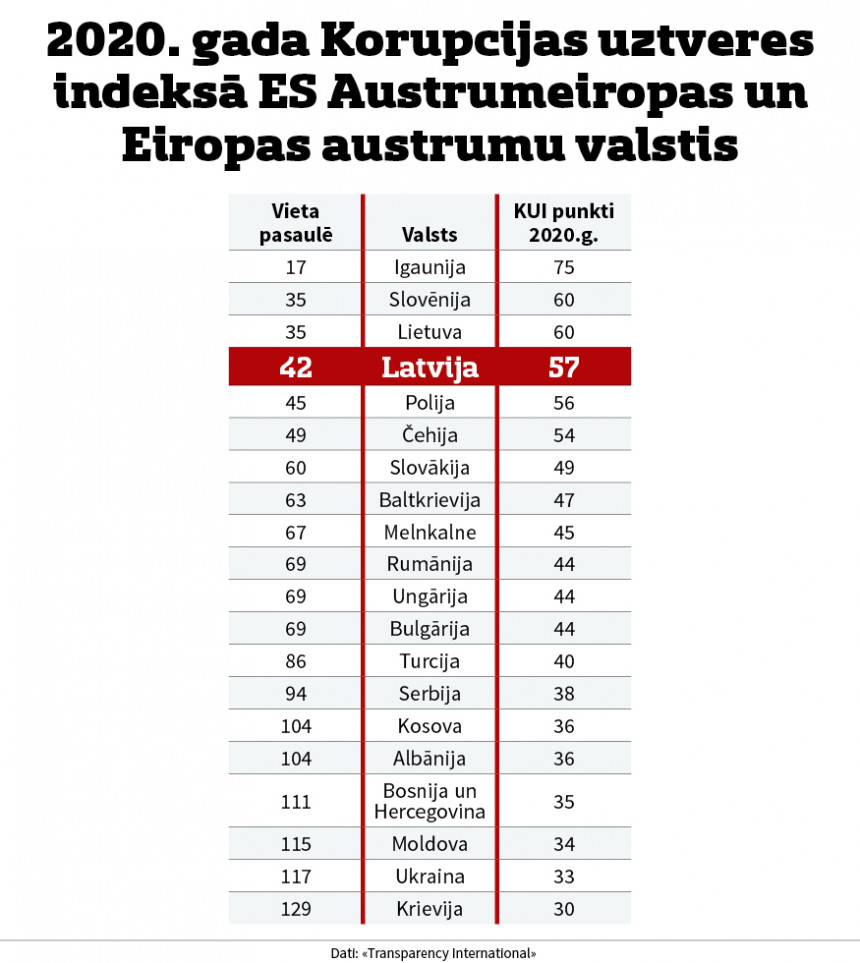Delna's results: Lukashenko's regime is less corrupt than Romania's and Bulgaria's democracies

Yesterday, the Society for Transparency - Delna, which is the Latvian branch of the international anti-corruption organization Transparency International, disseminated the 2020 results of the Corruption Perceptions Index (CPI) developed by Transparency International.
The announcement on Delna's website focused on the fact that "the results for 2020 show that, with a score of 57, Latvia ranks 42nd in the world, together with Cyprus and Costa Rica".
Delna's statement states: “Though the score has increased by one compared to the CPI 2019, Latvia is still lagging behind compared to other countries in the European Union (EU) and the Organisation for Economic Cooperation and Development (OECD). In the EU27, where the average CPI 2020 score is 64, Latvia ranks 15th out of 27 countries. Among OECD member states (average CPI score 66) Latvia ranks 28th out of 37 countries. This is part of a larger (and worrying) pattern of stagnation in corruption perceptions over recent years. Since 2014, Latvia’s score has increased just by 1. While the trend is similar in Lithuania (CPI 2020 score: 60), the performance of both countries is in stark contrast with that of Estonia, whose CPI score has slowly but constantly increased to 75 points in 2020 and is now well over the EU average and almost 20 points higher than Latvia”.
In turn, Director of Delna Inese Tauriņa promises that as the CPI grows, the flow of foreign investment to Latvia will increase: “we should also not forget that the CPI, and the sources behind it, are among the first things that foreign investors look at when they wish to do business in the country. This is of extreme importance in the context of the economic recovery following the Covid-19 pandemic".
Consequently, there is nothing surprising or unusual about Latvia in the results of the 2020 Corruption Perceptions Index. However, the results obtained by Transparency International on the "corrupt Lukashenko regime" - Belarus - are much more sensational. It turns out the Lukashenko regime is one of the least corrupt regimes in the countries of Eastern EU and Eastern Europe!
Slovakia ranked 60th in the world in the 2020 Corruption Perceptions Index with 49 points, while Belarus is very similar with 47 points and a high 63rd place in the world. According to information disseminated by Delna, democratic systems in EU member states such as Romania, Hungary and Bulgaria are much more corrupt than the Lukashenko regime. Much more terrible corruption than in Belarus is widespread in Montenegro, Turkey, Serbia and Albania. However, the most criminal corruption regimes, against which the Lukashenko regime seems like an unattainable ideal, are in Bosnia and Herzegovina, Moldova, Ukraine and Russia.
If the information disseminated by Delna is true, then the Belarus uprisings, protests, mass demonstrations and civil disobedience campaigns last year were led against one of the less corrupt regimes in Eastern Europe.
Then those who oppose the Lukashenko regime are, in fact, supporters of corruption, that the Belarussian regime should not be stifled with sanctions, but set as a model and example to be followed not only by Romania, Hungary and Bulgaria, but also by Bosnia and Herzegovina, Moldova and Ukraine.
I hope that upon reaching this place in the article, every reader understood the irony and the light caricature of the information disseminated by Delna.
I just need to remind you once again of the findings I have made about the Corruption Perceptions Index by Delna and Transparency International almost every year since the current index has been published. The Corruption Perceptions Index developed by Transparency International is the result of a survey! It shows how foreign investors perceive what is happening in the country in which they have invested. For decades, investors and economic experts have been told that if your business is doing badly somewhere, it is only because there is a lot of corruption in the country. People believed it, and that is what they tell in surveys. If business does not go as well as planned - corruption is to blame! Belarus coped relatively well economically with the pandemic. This is then also shown by investor surveys. Unfortunately, a large part of Latvian politicians and media workers have a mania to uncritically perceive the statements of various international bodies. We can only hope that after Transparency International's 2020 results on Belarus, Latvian policymakers will realize what drivel both Delna and Transparency International have been trying to feed us for years. It is high time to throw Corruption Perceptions Index tables into the garbage! On the other hand, those who will continue to jump like marionettes after any statement from Transparency International and Delna, will simply show their stupidity and incompetence.
